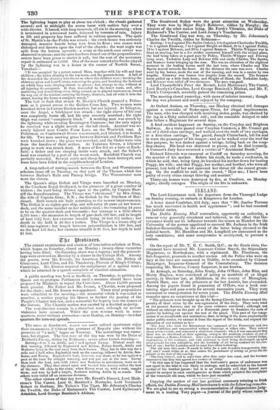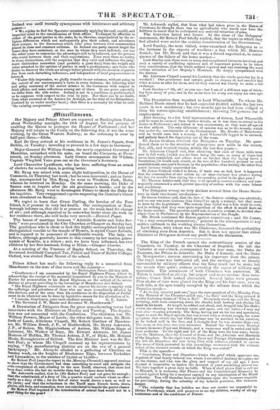IRELAND.
The Lord-Lieutenant took his departure from the Viceregal Lodge on Sunday evening, to embark at Kingstown for London.
A letter dated Castlebar, 23d July, says that "Mr. Justice Torrent has much recovered in health and appearance " ; and he had resumed his judicial duties.
The Dublin Evening Mail contradicts, apparently on authority, a rumour very generally circulated and believed, to the effect that Gct- vernment would use its influence towards the return as Member for the University of the person appointed to succeed Mr. Jackson in the Irish Solicitor-Generalship, in the event of the latter being elevated to the judicial bench. Mr. Hamilton and Mr. Longfield are announced as the only candidates; and some compromise is anticipated, to prevent a contest.
On the report of Mr. T. B. C. Smith, Q.C., on the Ennis riots, Go- vernment have removed Mr. Laurence Cruise Smyth, the Stipendiary Magistrate, to Borrisokane, with a reprimand. Mr. Fitzsimon, the Sub-Inspector, proceeds to another station All the Police who were on duty at the time are summoned to Dublin, to be examined by Colonel Macgregor, Inspector-General of the Constabulary. The decision respecting Mr. Browne, County Inspector, is not known.
At Armagh, on Saturday, John Brady, John O'Hare, John Rice, and Henry Hughes, were convicted of acting as members of an illegal society, in October last, at Middleton, in the county of Monaghan. Patrick Hare, one of the prisoners at the last Assizes, has absconded. Among the papers found in possession of O'Hare, was a book con- taining signs and pass-words for several successive years. They were sentenced to transportation for seven years. The Dublin Evening Mall remarks upon an occurrence at this trial-
" The prisoners were brought up on the Spring Circuit, but then escaped the penalty of their crime by the non-agreement of the Jury. They were tried at the present Assizes; and on the same evidence convicted; although not without an attempt on the part of a Romanist juror to frustrate the ends of justice by holding out against the rest of the panel. This part of the trainer action is so remarkable and instructive, that, to bring it the more emphatically under public notice, we extract it from the report of the trials, and request the attention of our readers to it— The Jury who tried the Ribandmen was composed of ten Protestants and two Roman Catholics. and empanuelled without challenge at either aide. They retired about set en o'clock, and rematued a short time closeted; when it was annouuced that there was no likelihood of their agreeing, owiug to the stubborn conduct of one of their umnber, a Roman Catholic. Alter some communication with the learned Judge, explanatory of the evidence, and with reference to their beiug dbeliarged, an aged juror pressed his own infirmities, and the hardship of all being confined for the con- duct of one ; but his Lordship said he must have them lucked up. • The old man theu said—it would be better for a man to endure transpotation him- self. audi would rather do so, than endure the punishment of serving on jstries like the present, in the state of this cow,try. • The Jury retired ; and in some time after they came into court, and the foreman announced that they had agreed to a verdict of Guilty.' "in this case it has happened that the boot-eater's power of endurance was not equal to the trial it was likely to undergo, and be submitted to the honest verdict of his brother jurors : but it is an intolerable evil that honest men should be subject to such contingencies as those which extorted the complaint of the venerable old man, which we have just recorded."
Copying the section of our last political summary relating to Irish affairs, the Dublin Evening Mail introduces it with the following remarks. We are glad to see so strong a recommendation of dispassionate judg- ment in a leading Tory paper—a journal of the party whose name in
Ireland was until recently synonymous with intolerance and arbitrary
power- ." We rejoice to find the Spectator occasionally, applying his cool, candid, and impartial mind to the consideration of Irish affairs. Ignwarped by affection to either of the great parties in the state, he is, likewise, unprejudiced by the re- ligious differences which not ;infrequently give their colour, and sometimes their temper, to the discussions which take place between rival communities placed in close and constant collision. In Ireland one party cannot forget the losses they have sustained, or the men by whom they were inflicted; nor can the other cease to remember the advantages still to be achieved, nor the persons who stand between them and their expectations. Even were there no reality in those distinctions, still the suspicion that they exist and influence the judg- ment diminishes somewhat (and probably a good deal) from the weight and value attached to the opinion of parties in such a predicament ; and those who desire to discover the truth are always better pleased with the decision of parties free from such disturbing influences, and independent of local prepossessions or interest. "Under this impression, we gladly transfer to our columns, without going to the extent of our contemporary's views in every instance, the following brief and pithy summary of the recent debates in the Commons with respect to Irish affairs, and some reflections arising oat of them. In one point especially we differ from the able writer. Ireland is not in a condition so problematical as he supposes with respect to the trial by jury. But there can he no doubt, from what occurred at the Assizes for Armagh, on the trial of the Ribandmen, (neticed by us under another head,) that there is a necessity for what he calls 'the existing compromise."



























 Previous page
Previous page